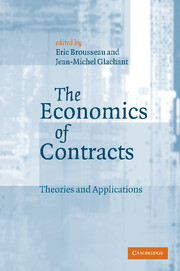Book contents
- Frontmatter
- Contents
- List of figures
- List of tables
- List of contributors
- Acknowledgments
- Part I Introduction
- Part II Contracts, organizations, and institutions
- 2 The New Institutional Economics
- 3 Contract and economic organization
- 4 The role of incomplete contracts in self-enforcing relationships
- 5 Entrepreneurship, transaction-cost economics, and the design of contracts
- Part III Law and economics
- Part IV Theoretical developments: where do we stand?
- Part V Testing contract theories
- Part VI Applied issues: contributions to industrial organization
- Part VII Policy issues: anti-trust and regulation of public utilities
- Bibliography
- Index of names
- Subject index
4 - The role of incomplete contracts in self-enforcing relationships
Published online by Cambridge University Press: 16 January 2010
- Frontmatter
- Contents
- List of figures
- List of tables
- List of contributors
- Acknowledgments
- Part I Introduction
- Part II Contracts, organizations, and institutions
- 2 The New Institutional Economics
- 3 Contract and economic organization
- 4 The role of incomplete contracts in self-enforcing relationships
- 5 Entrepreneurship, transaction-cost economics, and the design of contracts
- Part III Law and economics
- Part IV Theoretical developments: where do we stand?
- Part V Testing contract theories
- Part VI Applied issues: contributions to industrial organization
- Part VII Policy issues: anti-trust and regulation of public utilities
- Bibliography
- Index of names
- Subject index
Summary
Introduction
A major advance in economics involves the recognition that contracts adopted by transactors are incomplete. This fundamental insight has produced two main strands of economic research. One strand of research emphasizes the importance of self-enforcement in assuring contractual performance. Building upon Stuart Macaulay's pioneering study documenting that performance is secured in most business relationships not by the threat of court enforcement but by the threat of termination of the relationship, this work develops models of self-enforcement where a termination sanction is sufficient to assure transactor performance.
The other, more extensive, unrelated strand of economic research flowing from incomplete contracts is the principal–agent contract design literature. This work examines the role of contract terms in minimizing transactor malincentives given that performance can only imperfectly be contracted on. The major point of this chapter is that the incomplete contract terms actually used by transactors in the marketplace can be understood only by combining these two strands of research. What follows is a summary of my research on contracts from this perspective of integrating our research on incomplete contracts.
One way to integrate the two lines of research on incomplete contracts is to add self-enforcement considerations to the principal-agent model. The alternative way I have attempted this integration is by extending the simple model of self-enforcement to take account of the role of contract terms in facilitating self-enforcement. Contract terms are used as an aid to self-enforcement because the transactors' reputational capital through which the self-enforcement mechanism operates is limited (in the sense that transactors can credibly promise to pay only a finite maximum future amount to their transacting partners in return for current performance).
- Type
- Chapter
- Information
- The Economics of ContractsTheories and Applications, pp. 59 - 71Publisher: Cambridge University PressPrint publication year: 2002
- 10
- Cited by

